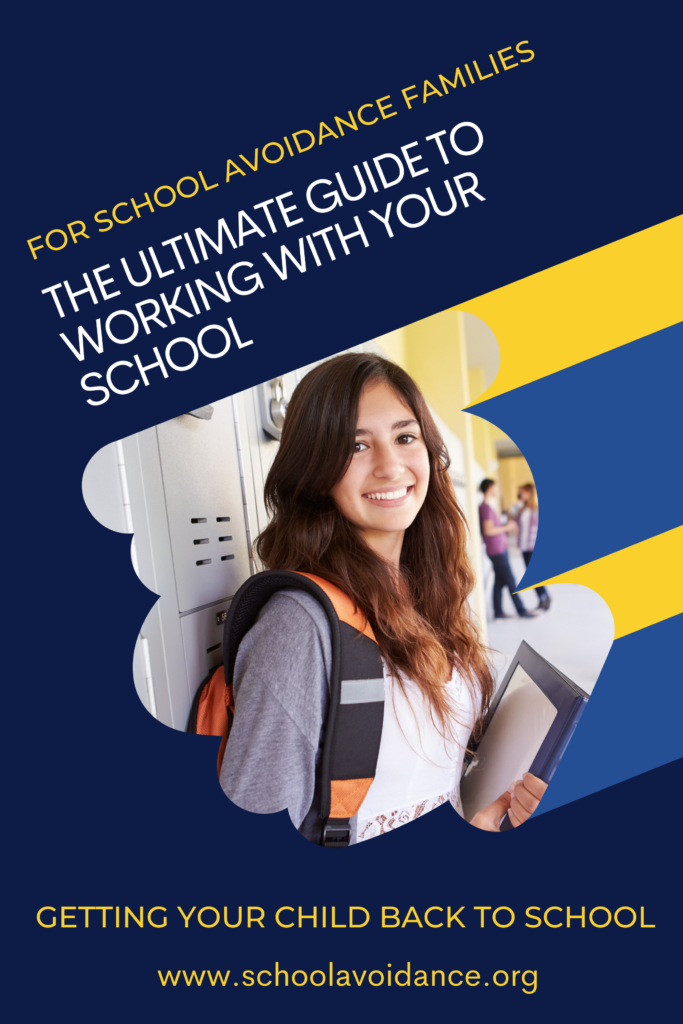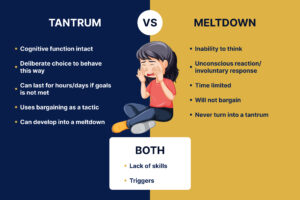
Navigating Tantrums and Meltdowns: Strategies for Parents and Caregivers
Tantrums and meltdowns are common occurrences in childhood, but they can be particularly challenging for parents and caregivers to manage.
Welcome to our School Avoidance Alliance blog. We are happy to see you here.
This is where we share articles, interviews, and information that provide help, hope and support to school avoidance families and educators.

Tantrums and meltdowns are common occurrences in childhood, but they can be particularly challenging for parents and caregivers to manage.

Pathological Demand Avoidance (PDA) is a complex behavior profile that is increasingly recognized within the autism spectrum. Characterized by an

In the diverse landscape of learning differences, dyscalculia stands out as a specific learning disability that significantly impacts an individual’s

In today’s fast-paced world, where stress and anxiety are often seen as commonplace, a significant concern for parents is the

The following information is from a candid discussion that I had with Dr. Steven Myers, Licensed Psychologist, Certified School Psychologist, and Board Certified School Neuropsychologist. He has been a practicing School Psychologist in New Jersey for the past 14 years and maintains a private practice in Bergen County.

A discussion with Dr.Naoki Maeda of the School of Social Welfare, Kyushu University of Health and Welfare, Nobeoka, Japan
Have you heard that exposure therapy is the treatment of choice for school avoidance?

For some reason, the role of the behavior analyst (Board Certified Behavior Analysts, BCBA) has been under the radar. They shouldn’t be, though. They can play an integral part in helping kids get back to school.

I had a lightbulb moment when I read this article by John Reily’ which discusses using hybrid learning as an opportunity for school refusal reintegration. Why wait until the Fall when it will be the same environment as before. Now is the time for schools to work with the families while there are fewer kids in the building.
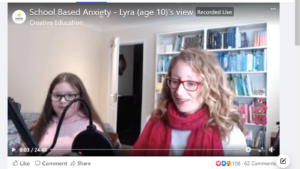
This is one of my top ten learning resources regarding anxiety-based school avoidance.
It is a video from Lyra, a very articulate 10 years old discussing her difficulties of going to school.
She provides keen insight into what has helped her get back to school.

We know that school avoidance is often misunderstood. Our friends and schools may question our parenting skills. They may share simplistic and insensitive advice. They usually mean well, but sometimes it hurts.

A few years ago, NPR did a piece called “Mental Health in Schools: A Hidden Crisis Affecting Millions of Students.” They cited that “nearly 80% of kids who need mental health services don’t receive them. Experts say schools could play a role in identifying students with problems and helping them succeed. Yet it’s a role many schools are not prepared for.”

The following are some very powerful insights that will help you better understand what a child who has an anxiety disorder, school refusal, or other emotional disorder feels while at school.

This article from Yale News features promising research about how parent training can help improve anxiety levels, tolerance and outcomes in their children. According to Dr. Eli Lebowitz, Director of the Program for Anxiety Disorders at the Yale Child Study Center.

During an anxiety-fueled situation with my daughter, she has often yelled at me that I just don’t get it. I understand her point. I do have a general idea of her thoughts and feelings but I am not in her shoes per se to feel the extreme discomfort and hear her mind speaking to her.
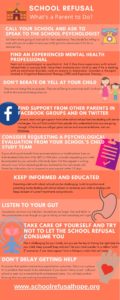
It’s quite bewildering when your child starts refusing to go to school. This isn’t anything that we were trained for as parents. Once this becomes a pattern, a disruption, or starts to cause a negative impact, then it is time to take immediate steps to help your child.

This is a good piece put together by Lauren Hoffman, PsyD and Steve Mazza, Phd from Columbia Psychiatry. It covers a few simple ways that you can help manage you and your child’s anxiety right now. They also provide some useful links for relaxation and entertainment.

“Every Child has a Portfolio of Who They Think They Are.”
When I heard these words at a presentation of The Nurtured Heart Approach; I immediately felt them through the eyes of a child who has school refusal. I sensed how using the Nurtured Heart Approach could build inner-wealth within a child who is challenged with school refusal.

Today I realized that this is a real issue. In some instances, schools have denied children with Individualized Education Plans (IEP’s) or 504 plans access to advanced classes. This is clearly against the laws of the Individuals with Disabilities Education Act of 2004 and the right to a Free and Appropriate Public Education (FAPE).
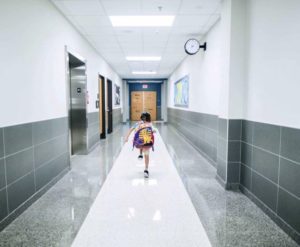
When I was in the thick of things with my son’s school refusal, I wish I could have spoken to other parents dealing with the same problem; discuss what was working, what failed, and just the support from another human living a similar experience would have provided comfort.
School refusal is complicated. There is no universal protocol and there is limited research to guide us. Therefore, an interchange of ideas and information is key to helping our kids.

School Refusal is a universal problem. Our website gets most of its traffic from the United States, but there are also many visitors from Australia, Canada, The UK, and France. I was surprised to see Cyprus and The United Arab Emirates. too. This story from By Alessia Cerantola from BBC World Service focuses on the school refusal problem in Japan.
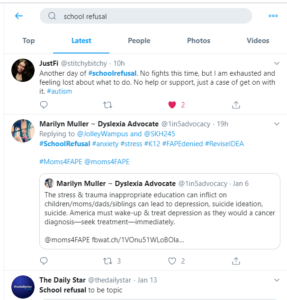
We know how much our kids value social media. They socialize, vocalize and entertain themselves with all the content and capabilities these platforms contain. What would you think if I told you that getting on a platform like Twitter could be helpful to people dealing with mental illness? And more specifically to our website’s audience; families with children who have school refusal
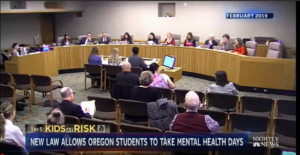
Oregon, Minnesota and Utah have passed laws allowing excused school absences for mental health. Both New York (NY Bill S6687) and New Jersey (NJ Bill 5780/S4122) are in the process of considering similar bills.
I was pretty excited when I first heard about these bills. On one hand; this will help to reduce the stigma

Educational Psychologist, Phylly Prtichard provides helpful ideas for schools and parents. It may sound basic, but these steps are often overlooked when helping kids dealing with school refusal. In addition, these strategies can be used for both young and older students. lmk what you think.

Trouble with homework can be an early sign of your child’s anxiety. The International OCD Foundation has a new website specifically for Anxiety in the Classroom. Their following teacher recommendations can be helpful to parents when discussing ideas for helping your child with anxiety.

The following story is from an email that I received from a mom discussing her daughter’s journey through school refusal.

This is a helpful article written and posted by Brook Road Academy, a day school in Richmond Virginia that welcomes school refusal kids and their families.
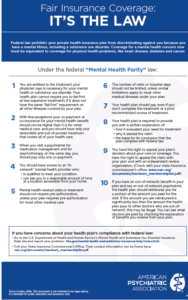
The uncertainty about mental healthcare costs keeps a lot of people from seeking help. Then the confusion about how your health insurance covers and reimburses for these costs adds another dimension of stress to families seeking help.
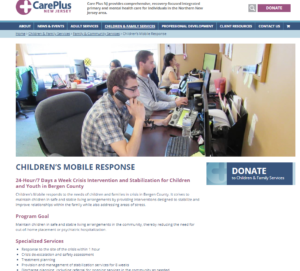
An often-overlooked resource is your county’s division of mental health. The federal and state government provide funding to support local mental health services.
Disclaimer: This site is designed by School Avoidance Alliance to assist parents, family, friends, caregivers, educators, advocates, and other professionals involved with helping children and finding resources to understand, help and cope with school avoidance, as well as to increase public awareness regarding school avoidance. The contents of this website are presented for informational and educational purposes only. Nothing on this website is to be construed as professional advice on medical, legal, technical, or therapeutic matters. By accessing and using the information on this site, you agree to waive any rights to hold the site developer(s), or any individual and/or group associated with this site, liable for any damage that may result from the use of the information presented.
Unfortunately only a small percentage of school professionals, therapists, educational advocates and policy makers understand school avoidance best practices. So, you must become the expert to ensure your child is getting:
The time passing slowly without progress is the worst feeling. It wouldn’t have taken five years of suffering and uncertainty if I had this expert guidance during my son’s school avoidance. We would have saved $29,000 in lawyer fees and $69,000 for private schools.
